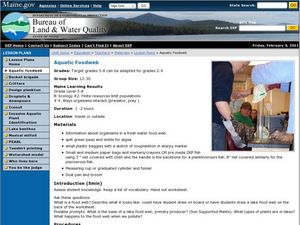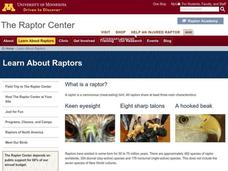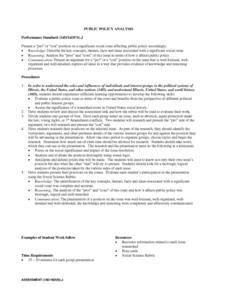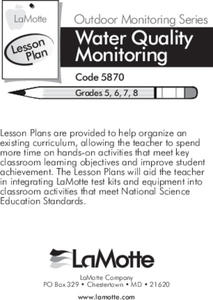Curated OER
Individual Resistance & Social Change
Students examine the Brown v. Board of Education case. In this segregation lesson, students study the details of the case and compare it the Mendez v. Westminster case.
Curated OER
Aquatic Foodweb
Students explore what a food web is. In this science lesson, students examine how nutrients and other pollutants enter a lake and play a food web game whereby students pretend they are either zooplankton, planktivore, piscivore, or...
Curated OER
Build An Island
Students explore erosion. In this science lesson, students build an island and observe the effects of erosion on the island. Students discuss freshwater ecosystems in Hawaii.
Curated OER
The Effect of Tides & Elevation on Wetland Plant Communities
Students comprehend how tides can impact shoreline plant communities through the study of a freshwater tidal marsh. They use actual tidal data to show that tidal ranges differ among geographic locations, even those relatively close...
Curated OER
River Study
Students study physical features of a local stream. They study how to identify water features on topographic maps.
Curated OER
Rivers... for Kids
Pupils investigate U.S. geography by exploring it's bodies of water. For this river formation lesson, students identify the reasons rivers are needed in our country by reading assigned text. Pupils examine a diagram which explains how...
Curated OER
The Politics of Water
Students investigate the Governor's Kansas Water Initiative. Students study rivers, cities and reservoirs and how their location effects the importance of their water quality issues.
Curated OER
Salinity and Brackish Water Systems
Young scholars are able to tell the difference between brackish and salt water. They also are able to distinguish water qualities specific to each type of water. Students answer various questions about all types of water.
Curated OER
The Five Finger Exercise
Students understnad the importance of keeping our rivers and streams pollution free by remembering the major rivers of northeast Kansas. The see how the rivers contain particles of every substance that drains into them.
Curated OER
Pollutants and Contaminants
High schoolers define pollution and contaminants by constructing a Definition and Concept Trail that illustrates how they are connected to health. They give examples of health issues during the Industrial Revolution by conducting...
Curated OER
Public Policy Analysis
Students read an article about a pressing public policy issue. Using the text, they identify the themes, facts and ideas presented and develop an argument supporting or disagreeing with the position of the author. In groups, they...
Curated OER
Water Resources
Students explore the differences between surface water and ground water. They collect data using maps and graphs and investigate a Texas river basin and a nearby aquifer. They complete a written report of their findings regarding the...
Curated OER
Oak Ridges Moraine: Southern Ontario's Sponge
Students examine the characteristics of the Oak Ridge Moraine in Canada. Using a map, the locate the moraine and present and defend a position on how the resources found there should be used. They must use proper geography terminology...
Curated OER
Introduction to the Barnegat Bay Estuary
Students research estuaries. In this estuaries lesson, students discuss the differences in a bay and an ocean. Students watch a PowerPoint of the properties of the estuaries and geography of Barnegat Bay. Students complete a worksheet...
Curated OER
Water Walk
Students conduct a visual survey to discover information about local land use and water quality; document their findings by mapping and profiling the water body; and use this initial investigation to raise questions about local land use.
Curated OER
Native Species Restoration and its Impact on Local Populations
High schoolers watch video clips of ecosystems and answer questions relating to them.
Curated OER
Teaching about Conductivity
High schoolers explore conductivity and productivity in aquatic systems.
Curated OER
Aquatic Communities
Students watch a video about aquatic communities. They conduct an experiment that shows how movement of rivers change the landscape. They compare fresh and salt water communities and its wildlife.
Curated OER
Fish Now or Later
Students describe the effects of over-harvest on a salmon population. They explain the importance of salmon to many communities in Alaska. They manage harvest levels to maintain a sustainable population.
Curated OER
Water Quality Monitoring of Natural Water
Young scholars create their own monitoring program for natural water. They collect samples from an appropriate sampling site. They perform chemical and biological analyses of their samples. They present their information to the class.
Curated OER
Stratigraphy -- Layers of Time in the Earth
Learners are introduced to the process of stratification. Using the internet, they read about the Richard Beene archeological site near San Antonio. Using a map, they color code the different layers present at this site and answer...
Curated OER
Life in Extreme Environments - Lakes Under Ice
Young scholars collect chemical, physical, and biological data from a local lake throughout the year. In addition, students discuss the design of an experimental structure for water collection at several specific depths as well as assess...























